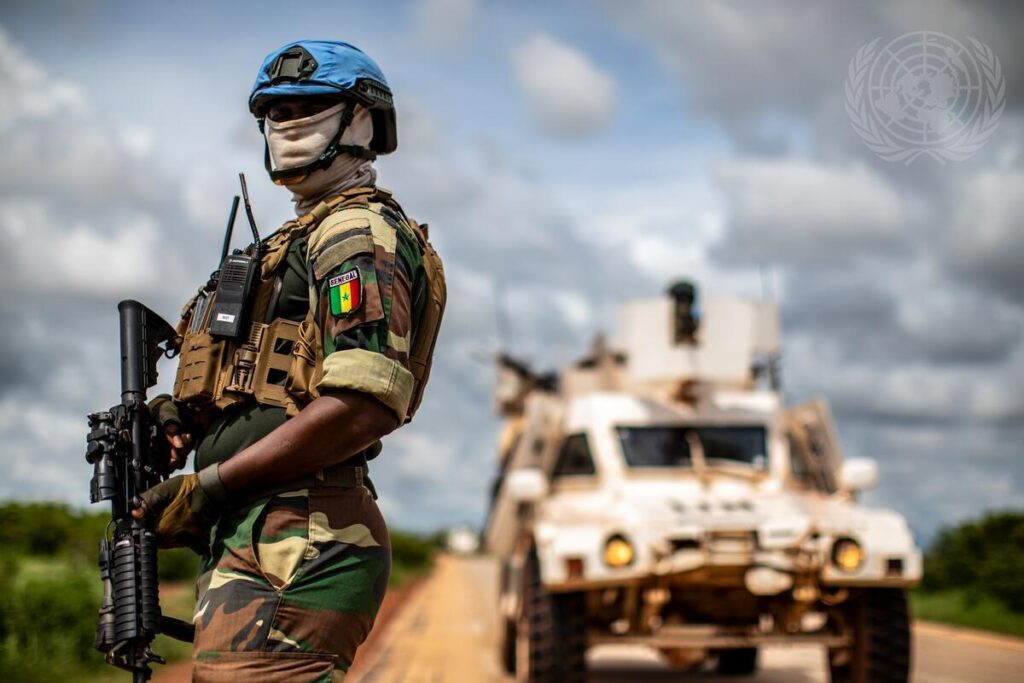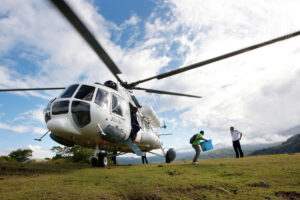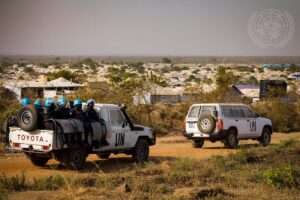Introduction
On March 14, 2023, the International Peace Institute (IPI), the Stimson Center, and Security Council Report co-organized a workshop to discuss the lessons learned from their long-standing project “Prioritization and Sequencing of Security Council Mandates.” Since the project’s inception in 2016, more than thirty closed-door workshops have been convened with the aim of making UN peace operations more effective by helping member-state representatives, UN staff, and independent experts analyze how mandates can be adapted to reflect overarching political objectives and better respond to political processes and operational dynamics on the ground.
Given the interest in continuing this project, the project partners decided to convene a lessons learned workshop to capture feedback and document suggestions for improving the project. The event brought together approximately twenty stakeholders who have participated in previous workshops, including representatives of Security Council members (including penholders) and other member states, officials from UN headquarters and missions, and researchers and civil society representatives who focus on UN peace operations.
The half-day workshop was designed around two sessions. The first addressed broader strategic and political issues that impact the Security Council and the mandating process for UN peace operations. The second solicited feedback on and lessons learned from the project, considering how it could more effectively achieve its objectives given current political realities.
This note summarizes observations raised during the first part of the workshop, focusing on current trends, practices, and dynamics related to the mandating process within the Security Council and its impact on UN peace operations. Overall, the discussion revolved around three main issues: the increasingly polarized Security Council and its mandating practices, the role of elected members (E10) and host states in the penholder system, and the effective prioritization and sequencing of mandates.
A Polarized Council
The mandating process for UN peace operations has been particularly affected by the dissension that has paralyzed the Security Council since the Russian invasion of Ukraine in February 2022. While the political divides within the council are not new, it has been harder to achieve consensus in the past year. Divisions over peacekeeping mandates’ provisions on the use of force; human rights; women, peace, and security (WPS); and elections have increased. These divisions have resulted in a decrease in the proportion of unanimous resolutions, dropping from 90 percent in 2021 to 68 percent in 2022.1Adrian Steube, “Voting Wrap-Up of the UN Security Council in 2022: Bitterness Mixed with Agreements,” PassBlue, January 9, 2023.
Some participants suggested that the growing number of abstentions on peace operations mandates is partially an attempt by member states to express dissatisfaction with the negotiation process—for example, a perceived lack of inclusion—rather than with the mandate’s content. Participants underscored that the erosion of council support has consequences for the credibility and legitimacy of missions, impacting their ability to fulfill their mandates effectively. At the same time, participants questioned how broader political dynamics are affecting member states’ assessments of the minimum political and security conditions necessary for the deployment of a peacekeeping mission. For example, in Mali, member states may be reluctant to withdraw not only because of concerns for the protection of the Malian population but also because of the political consequences, including the effect on the broader balance of power.
Some participants perceived the growing divides in the council as an opportunity for the Secretariat to play a more prominent role in facilitating and framing the conversation between member states and peacekeeping missions. For example, in its latest strategic review of MINUSMA, the Secretariat “provided the Government of Mali with an opportunity to set out directly its national priorities on operational matters, including its expectations with respect to the implementation of the mandate of the mission.”2UN Security Council, Internal Review of the United Nations Multidimensional Integrated Stabilization Mission in Mali—Report of the Secretary-General, UN Doc. S/2023/36, January 16, 2023. This new dynamic, however, opens the door for further division between the mission and the host state, since the host state’s preferences are not compatible with the principles, doctrines, and capabilities of UN peacekeeping.
Role of Host Countries and the Penholder System
One particularly prominent issue the council is grappling with is the role of host states in mandate renewal processes. Some participants underscored the proactive engagement of states like Colombia, Haiti, and Sudan with the council as a positive development. Others cautioned against the increasingly demanding posture of host states, which have been emboldened by divisions in the council. Some host states have increased pressure on the council to consider mandates that enable activities similar to peace enforcement in settings that face ongoing threats from armed groups and spoilers, leveraging a landscape marred by state-affiliated private military and security companies. In this context, one participant stressed the importance of emphasizing that the role of UN support is not to provide regime security but to serve a political end goal. Another highlighted that the host state and Security Council may have differing visions for the political end state, and the council should further discuss the necessary conditions for peace operations to continue operating throughout their life cycle.
Discussions also focused on how much say the host country should have in developing Security Council products, particularly peacekeeping mandates under Chapter VII of the UN Charter. The prevailing penholder system remains opaque and is increasingly contested by host states, which request to be systematically consulted throughout the process. Workshop participants discussed ways to increase transparency and public communication during the mandate negotiation process to alleviate tensions between penholders and host states. While some penholders may be able to engage host states behind the scenes to solicit agreements and compromises, some of these relationships have deteriorated in recent years, particularly in relation to multidimensional peacekeeping missions.
Some participants pointed to the growing influence of elected members, arguing that the penholder system should be reformed to allow elected members, such as the three elected African states (A3), to take on more responsibilities as co-penholders during mandate negotiations. Others, however, cautioned that the A3’s tendency to closely align with host states’ positions could allow host governments to exert undue pressure in mandate negotiations. Emboldened by the support of some of the A3 and divisions among the five permanent members, some host states have had growing success in dictating their terms in mandate renewal negotiations. For example, when the Security Council extended MINUSMA’s mandate by a year in June 2022, the Malian government explicitly denied the mission the right of free movement to investigate alleged human rights abuses, a core part of its mandate. The government also expressed its expectation that MINUSMA “give top priority to the security aspect of its mandate,” “change its static posture,” and “engage in offensive actions.”3UN Doc. S/2023/36, Annex.
Streamlining and Prioritizing Mandates
Participants also discussed the extent to which mandates should be streamlined. In recent years, mandates have been increasingly streamlined to emphasize core priorities. This approach breaks with the tradition of “Christmas-tree” mandates, which bury critical priorities in lengthy lists of tasks that reflect the agendas of multiple actors involved in mandate negotiations. Overall, participants agreed that the streamlining of peace operations mandates in South Sudan, the Central African Republic (CAR), and the Democratic Republic of the Congo (DRC) has helped missions better adapt to evolving situations on the ground. While they acknowledged positive steps taken to incorporate normative language on internally displaced persons (IDPs), protection of civilians (POC), WPS, and climate change in mandates, they also cautioned against excessive use of jargon that may not add value or clarify priorities.
However, some called for caution, as it might be too early to assess the full impact of cuts in language on the implementation of priority activities like POC. While streamlining may reduce lengthy and redundant text, participants raised concerns over the potential loss of hard-won language and the normative developments it captures. For some participants, opening up previously agreed mandate language is a risky exercise given the geopolitical and normative divisions in the Security Council. Some member states may take advantage of this exercise to push back against provisions on human rights, WPS, and POC, instead advancing priorities related to security and support to host states. Moreover, excessive streamlining could have unintended consequences for resource mobilization, including funding and staffing.
Discussions also focused on the utility of including a series of strategic objectives in mission mandates. The articulation of a multi-year vision in UNMISS’s mandate for South Sudan exemplifies a good practice to help missions frame and sequence their work if the benchmarks are realistic.4“UNMISS’s mandate is designed to advance a three-year strategic vision to prevent a return to civil war in South Sudan, to build durable peace at the local and national levels, and to support inclusive and accountable governance and free, fair, and peaceful elections in accordance with the Revitalised Agreement.” UN Security Council Resolution 2567 (March 12, 2021), UN Doc. S/RES/2567. By adopting a similar approach in other missions, the council could focus on steering transition processes and continuing to meet the established benchmarks after the mission departs.
Some participants raised concerns that the mandate language emerging from the council’s political negotiations does not always reflect the deteriorating conditions facing missions on the ground. One participant argued that mandate negotiations should not be impeded by negotiations over individual words but should be guided by the imperative of adapting mandates to evolving conditions on the ground. Overall, participants agreed that mandates serve various purposes for different audiences, such as making political statements, providing operational direction, requesting resources, and serving as communication tools, making the drafting process a delicate balancing act.
Conclusion
Overall, participants emphasized that divides in the Security Council have hindered the ability of UN missions to effectively carry out their mandates. They therefore suggested that the Secretariat be more involved in conversations between member states and peacekeeping missions while cautioning against the potential divides this could create between missions and host states. Participants also recommended an increase in communication between penholders and host states during the mandate negotiation process but warned against the possibility of host governments exerting undue pressure during negotiations. Finally, participants agreed that streamlining mandate language has allowed missions to adapt to evolving situations on the ground but asserted that it is still too early to determine the full impact of language cuts, particularly on priority activities like human rights, POC, and WPS.
Photo Caption: A UN peacekeeper stands guard at a stop on the way to the village of Ogossagou in the Mopti region of central Mali. Credit: UN Photo/Harandane Dicko.
Notes
- 1Adrian Steube, “Voting Wrap-Up of the UN Security Council in 2022: Bitterness Mixed with Agreements,” PassBlue, January 9, 2023.
- 2UN Security Council, Internal Review of the United Nations Multidimensional Integrated Stabilization Mission in Mali—Report of the Secretary-General, UN Doc. S/2023/36, January 16, 2023.
- 3UN Doc. S/2023/36, Annex.
- 4“UNMISS’s mandate is designed to advance a three-year strategic vision to prevent a return to civil war in South Sudan, to build durable peace at the local and national levels, and to support inclusive and accountable governance and free, fair, and peaceful elections in accordance with the Revitalised Agreement.” UN Security Council Resolution 2567 (March 12, 2021), UN Doc. S/RES/2567.




